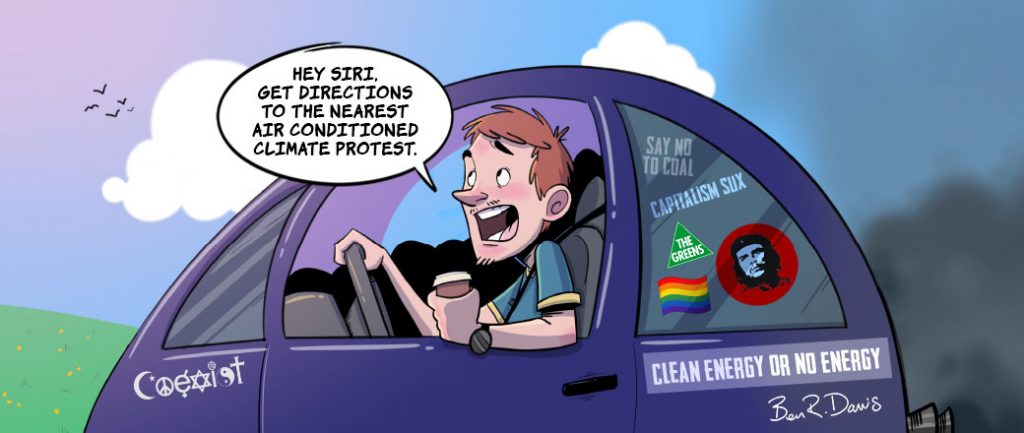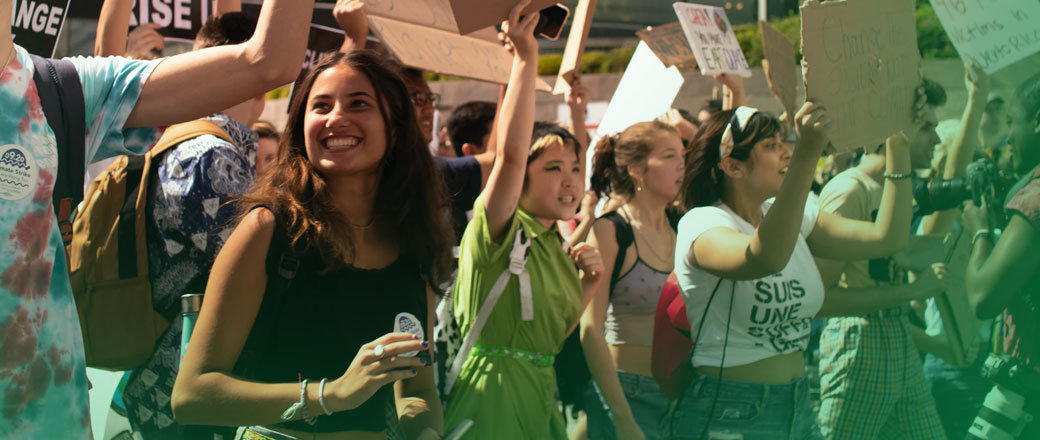Back in 2012, The Australian published an article warning that by 2020 there would be hardly any more snow in Australia due to the catastrophic effects of climate change. According to Professor Katherine Pickering, from the Griffith School of Environment:
We’ve predicted by 2020 to lose something like 60 percent of the snow cover of the Australian Alps.
Well, that sure didn’t age well.
The increase in climate alarmism seems to mimic a growth in the number of younger generation protestors, with the 16-year-old Greta Thunberg leading from the front. Following on from this, climate strikes are growing in number and popularity, with the most recent protest amassing thousands of adolescents.
As an 18-year-old high school graduate myself, I empathise with the inclination of many in my generation to be alarmed about such environmental concerns. In fact, I was very much in the same boat earlier this year.
What are some of the reasons why so many young people are drawn to this polarising political issue?
1. A desire for something greater
‘You don’t understand yourself really as an individual, you understand yourself as part of something bigger’. Khaled Hosseini, The Kite Runner
People are often psychologically attracted to committing to something greater than themselves. This forms the foundation for communities, military service, charity work and religious values etc. However, with the rise of climate alarmism, it seems that my generation are drawn to towards nothing less than ‘saving the world’. As Hosseini observes, we all search for something greater to form our identity.
2. A sense of legacy
‘If you would not be forgotten as soon as you are dead, either write something worth reading or do something worth writing’. Benjamin Franklin
There is probably nothing more important than the legacy and memory that one leaves behind. Young people today, in particular, are faced with the existential fear that such a prospect may not be possible. Whether or not these alarmist predictions are true, a sense of legacy intertwines activist rhetoric and underlying dogma.
3. A spirit of fear
‘The most powerful motivator of all, is fear’. Robert Wilson
If you were told that the world was ending in seventy years—give or take—would that not rightly invoke an emotional response? Well, what we’re seeing today is an emotionally driven wave of environmental hysteria, closely mimicking Arthur Miller’s, The Crucible. Because we fear the most what we cannot see.
4. A search for virtue
‘The person who talks most of his own virtue is often the least virtuous’. Jawaharial Nehru
Across the ages, nothing seems more appealing than being validated by those around you. Greta Thunberg’s recent ‘rebuke’ to the United Nations—and especially the thunderous applause and validation which followed—taps into the deeper desire for youth around the world to similarly find such praise. As Nehru rightly observes, we’re all filled with an earnest longing to be seen as virtuous.

5. A desire for control
‘Control desire: refers to a subject of circumstance or relationship that an individual may want to exert control over’. Wikipedia
The need for control in an ever-present prediction of apocalyptic chaos seems to be the pervading ‘atmosphere’ for young people today. Without a God or higher power to submit to, human beings’ greatest desire is to be in control of their own life and destiny. Such a desire to control one’s own world may well be fuelling the climate alarmism.
6. A rise in self-esteem dogma
‘There is a real danger in believing it when people use the word ‘Genius’, and it’s even more dangerous when we let hubris tell ourselves we are’. Ryan Holiday ‘Ego is the Enemy’
Both in public and private schools throughout Australia, students are pushing for academic excellence. This feeds the constant self-esteem rhetoric that ‘you can do anything’ and ‘you can change the world’ which youth today have been raised upon. This is quintessential to youth protest and climate alarmism that we see today in our younger generation.
7. An anti-establishment psyche
‘Disobedience, in the eyes of anyone who has read history, is man’s original virtue’. Oscar Wilde
Down through the ages, youth have been stereotyped and often fulfil the ‘anti-establishment’ role in society. Statistics show that the majority of youth are of a progressive political inclination. This changes overtime, as age brings responsibility, and breeds conservative values as the following graph of the recent UK election demonstrates:

8. The progressive virtue of victimhood
‘Claiming to be a victim gives people a perverse authority. Subjective experience becomes key… as victim status can buy special privileges’. Claire fox
It seems that victimhood is the new virtue. Nothing achieves more power, like victimhood. This has now become the ‘go-to’ emotional heartstring of the alarmist movement, as Thunberg refrains, “You have stolen my future”. Not bad for someone who was Time magazines, Person of the Year for 2019!
9. A quasi-religious faith
‘Animism is the religious belief that objects, places and creatures all possess a distinct spiritual essence.’ Oxford dictionary
In today’s zeitgeist, the UN debates whether “Mother Earth” deserves human rights. In Kyrgyzstan, the parliament sacrificed seven sheep to dispel evil spirits, and it is estimated 40% of the world holds to some form of animistic belief. Closer to home, due to the integration of aboriginal culture and dream time spirituality, ‘Land’ has become an increasingly valued concept in modern society, to which we now seem to attribute spiritual worth. It seems such ethereal concepts, may be fuelling a rise in youth climate alarmism.
10. A lack of hope beyond his world
‘The hope of the righteous brings joy, but the expectation of the wicked will perish’. Proverbs 10:28
Of greatest concern, is the rising tides of depression and ennui within our youth. Without a Biblical worldview, climate change offers no hope beyond the catastrophe that is to come. This lack of hope present in today’s western culture is a large factor in youth searching for a better future.
While I empathise with such a desire to be alarmed, what made the difference for me was being more widely informed and understanding the difficulty to accurately predict both the climate and its impacts. Predictions that fall short even from a few years ago like here, here and here reaffirm our inability to foresee in years to come, just how our earth will react.
Moreover, understanding Australia’s past climate of bushfires and temperature and our recent cooling period, made me more sympathetic to a subdued alarmist perspective. It is such a desire to learn, to be informed and to understand both the political and scientific influences, that our younger generation should latch onto. For my greatest fear, would be a descent into an emotionally driven echo chamber of hysteria and irrationality.
























You must be logged in to post a comment.